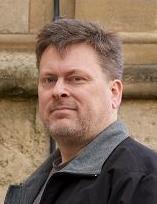
Edward Feser (right) explains how mathematics illustrates some of the qualities we associate with God:
Mathematics appears to describe a realm of entities with quasi–divine attributes. The series of natural numbers is infinite. That one and one equal two and two and two equal four could not have been otherwise. Such mathematical truths never begin being true or cease being true; they hold eternally and immutably. The lines, planes, and figures studied by the geometer have a kind of perfection that the objects of our -experience lack. Mathematical objects seem -immaterial and known by pure reason rather than through the senses. Given the centrality of mathematics to scientific explanation, it seems in some way to be a cause of the natural world and its order.
How can the mathematical realm be so apparently godlike? The traditional answer, originating in Neoplatonic philosophy and Augustinian theology, is that our knowledge of the mathematical realm is precisely knowledge, albeit inchoate, of the divine mind. Mathematical truths exhibit infinity, necessity, eternity, immutability, perfection, and immateriality because they are God’s thoughts, and they have such explanatory power in scientific theorizing because they are part of the blueprint implemented by God in creating the world. For some thinkers in this tradition, mathematics thus provides the starting point for an argument for the existence of God qua supreme intellect. [name], “Keep it simple” at First Things
Dr. Feser’s most recent book is Aristotle’s Revenge: The Metaphysical Foundations of Physical and Biological Science (2019).
See also: A simple triangle can disprove materialism. Conventional descriptions of material processes do not help much when we are trying to account for abstract thought.
and
If computers are intelligent, climbing a tree is flying That, says Edward Feser, is the take-home message from Gary Smith’s book, The AI Delusion.
Hat tip: Philip Cunningham